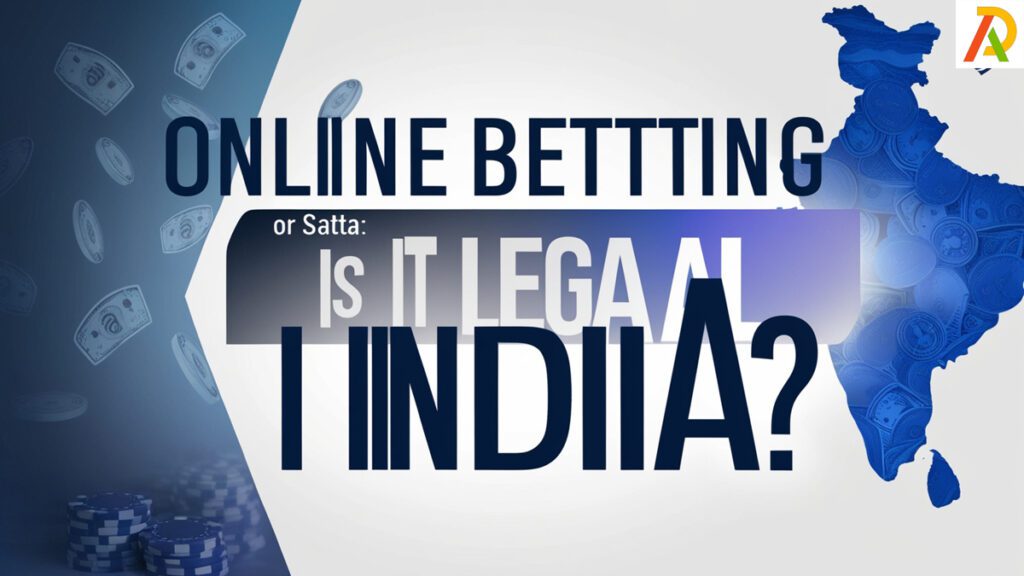Online Betting or Satta: Is It Legal in India?

Online gambling is a rapidly growing industry in India, fueled by the increasing penetration of the internet and smartphones. However, the legal framework surrounding satta or online betting and gambling in India is complex, ambiguous, and largely dependent on state-specific legislation. This article delves into the key laws governing online betting in India and relevant case laws that provide insight into how courts have interpreted these statutes.
Laws Regarding Online Betting or Satta in India with Case Laws
India’s legal framework for online gambling is complex and varies across states. The Public Gambling Act of 1867 is the primary legislation governing gambling in the country. However, this law predates the advent of online gambling and does not specifically address internet-based platforms. States like Sikkim and Nagaland have enacted laws to regulate online gambling within their jurisdictions. At the same time, others, like Tamil Nadu, have imposed strict bans.
As mentioned earlier, there is an absence of transparency and consistency in the laws nationwide regarding online betting. There is exclusively one judgment, M/s Gaussian Networks Pvt. Ltd. v. Monica Lakhanpal and the State of NCT. This judgment argued about online gambling and mentioned the following:
- If players play a game that necessitates a game of skills with stakes, then it does not represent gambling.
- Players playing any game of skill in virtual platforms to make money would be considered illegitimate, while it would be legitimate on physical premises.
- It is deemed unlawful if the players get engrossed in the game only because of winnings.
- Gaming sites can’t unite the winning cards as it would encourage online betting.
Delhi District Court recalled the case subsequently at the concluding contention of the revision petition. Therefore, there is no case in point that it determined, or can be denoted any longer.
Overview of Gambling Laws in India
The Public Gambling Act of 1867 primarily governs India’s gambling laws. It is a pre-independence legislation that prohibits the operation of gambling houses and public gaming. However, the Act does not explicitly address online gambling, as it predates the digital era. The absence of a comprehensive central law regulating online gambling has resulted in individual states enacting their laws on the subject. States like Goa, Sikkim, and Nagaland have legalized certain forms of gambling, while others like Tamil Nadu and Telangana have imposed stringent restrictions.
The Public Gambling Act, 1867
The Public Gambling Act of 1867 is the foundational legislation regulating gambling in India. It criminalizes the operation of public gaming houses and participation in gambling activities within these establishments. The Act, however, distinguishes between games of skill and games of chance, with the former being exempt from its purview. Games of skill, such as chess, rummy, and horse racing, come under the legal category, while games of pure chance face prohibition. This distinction has significant implications for online gambling platforms that claim to offer skill-based games.
Information Technology Act, 2000
The Information Technology Act of 2000 indirectly impacts online gambling by addressing online content and cybersecurity issues. Section 69A of the Act empowers the government to block access to online platforms that promote activities contrary to public order or morality. This provision has been invoked to restrict access to certain gambling websites. Additionally, intermediaries hosting gambling content must comply with the IT Rules, 2021, which mandate removing unlawful content.
State-Specific Legislation
Gambling is a state subject under the Indian Constitution. Therefore, individual states can enact gambling laws within their jurisdictions. For example, the Sikkim Online Gaming (Regulation) Act, 2008 permits licensed operators to offer online gaming services in Sikkim. Similarly, the Nagaland Prohibition of Gambling and Promotion and Regulation of Online Games of Skill Act, 2016 regulates skill-based online games like poker and rummy. On the other hand, states like Tamil Nadu and Telangana have passed laws banning online gambling altogether. They cited concerns over addiction and financial ruin among users.
Key Case Laws on Satta or Online Gambling
1) State of Andhra Pradesh v. K. Satyanarayana (1968)
In this landmark case, the Supreme Court held that rummy is a game of skill, not chance. The judgment established a critical precedent for differentiating between games of skill and games of chance, a distinction that continues to influence the legality of online gaming platforms in India. The court differentiated between games of skill and games of chance, allowing the former under specific conditions.
2) Dr. K.R. Lakshmanan v. State of Tamil Nadu (1996)
The Supreme Court ruled that horse racing is a game of skill, emphasizing that activities involving substantial skill are not gambling. This case further reinforced the legal standing of skill-based games in India.
3) The All India Gaming Federation v. State of Tamil Nadu (2022)
This case challenged the Tamil Nadu Gaming and Police Laws (Amendment) Act, 2021, which banned the state’s online games, including rummy and poker. The Madras High Court struck down the amendment, stating that the prohibition of skill-based games was unconstitutional. The judgment underscored the importance of distinguishing between games of skill and games of chance in framing gambling laws.
4) Avinash Mehrotra v. State of Rajasthan (2021)
In this case, the Rajasthan High Court examined the legality of fantasy sports platforms like Dream11. The court held that fantasy sports involve a significant degree of skill and are therefore exempt from gambling prohibitions under the Public Gambling Act of 1867.
5) Mahalakshmi Cultural Association v. State of Tamil Nadu (2012):
This case addressed the legality of rummy played for stakes, ultimately allowing it as a game of skill.
Recent Developments and Challenges
The advent of online gambling platforms has posed unique regulatory challenges for Indian authorities. The lack of uniformity in state laws has created a fragmented legal landscape, leading to confusion among operators and users. Additionally, concerns over addiction, money laundering, and consumer protection have prompted calls for stricter regulations. The central government has been considering the introduction of a comprehensive framework to regulate online gambling. However, no concrete legislation has been enacted so far.
International Perspective on Online Betting / Satta
Countries like the United Kingdom and Malta have established robust regulatory frameworks for online gambling, ensuring transparency and consumer protection. These models could serve as valuable references for India in formulating its laws. Adopting best practices from international jurisdictions could help India balance promoting a burgeoning industry and safeguarding public interests.
In a nutshell
The legal landscape for online gambling in India remains a complex interplay of central and state laws, judicial interpretations, and regulatory challenges. While skill-based games enjoy a relatively favorable legal standing, the ambiguity surrounding games of chance continues to pose challenges for operators and users alike. Comprehensive legislation at the central level could harmonize state laws and incorporate international best practices. They could provide much-needed clarity and stability to the industry. Until then, the legality of online gambling in India will largely depend on judicial interpretations and state-specific regulations.
Punishment for Illegal Online Gambling (Satta) in India
Engaging in illegal online gambling can lead to severe penalties under Indian law. The Public Gambling Act of 1867 imposes fines and imprisonment for operating or participating in unauthorized gambling activities. Penalties can include:
- A fine of up to INR 200.
- Up to three months in prison. Penalties can be more severe in states with stricter laws, such as Maharashtra. Repeat offenders may face harsher consequences, including extended jail terms and higher fines.
India GST Enforcement Agency Rendered Blocking Authorities for Tax-Evading Gaming Sites
The Indian government has recently granted the GST enforcement agency the authority to block gaming websites that evade taxes. This move comes amid growing concerns over online gambling platforms that bypass legal tax obligations. This leads to significant revenue losses for the country. By empowering the Directorate General of GST Intelligence (DGGI), India aims to tighten online betting and gambling regulations. This development highlights the government’s proactive measures to address tax evasion in the high-risk online gambling industry.
DGGI Labels Online Gambling as Speculative Segment
The Directorate General of GST Intelligence (DGGI) has classified online gambling as a speculative sector due to its potential for money laundering and tax evasion. The agency has flagged several websites and platforms that operate without proper licenses or fail to adhere to tax laws. By labeling online gambling as high-risk, the DGGI is emphasizing the need for stricter enforcement and monitoring mechanisms. This move also underscores the risks that players and operators face when engaging in unregulated gambling activities.
Frequently Asked Questions (FAQs) on Online Betting or Satta
a) Is online gambling or satta now legal in India?
Online gambling is not universally legal in India. It depends on state laws and whether the activity is classified as a game of skill or chance.
b) Which state prohibited online gambling in India?
States like Tamil Nadu, Andhra Pradesh, and Karnataka have implemented bans on online gambling to curb its social and economic impacts.
c) What is the maximum punishment for gambling?
Under the Public Gambling Act of 1867, the maximum punishment for gambling is three months of imprisonment and a fine of INR 200.
d) Can someone go to jail for online gambling in India?
Yes, individuals participating in illegal online gambling can face imprisonment, depending on the laws of their respective states.
e) What is the number 1 rule of gambling?
The number one rule of gambling is to “never bet more than you can afford to lose.” Responsible gambling ensures financial safety.
f) Which form of gambling is legitimate in India?
Games of skill, such as rummy, poker, and horse racing, are legal in India as they are not considered gambling under the law.
g) What is the 777 in gambling?
“777” symbolizes a jackpot in slot machines and represents good luck in gambling culture.
“Navigating the Shadows: The Legal Framework and Enforcement Challenges of Illegal Online Gambling in India”
Online gambling is a growing concern in India, where the legal framework for such activities remains complex and fragmented. The primary law governing gambling in India is the Public Gambling Act of 1867. It prohibits running or being in charge of a public gambling house. However, this regulation does not explicitly cover online gambling, leading to legal ambiguities that create challenges for enforcement.
There has been a phenomenal increase in digital platforms offering betting and gambling services. Consequently, many people now participate in online gambling without understanding the legal implications involved. Indian law does not uniformly cover all forms of gambling. For instance, the law allows for certain betting activities in several states, such as horse racing and lotteries, yet prohibits others. Most importantly, states like Goa and Sikkim have gambling laws, allowing them to regulate online gaming under specific conditions. This uneven application leads to confusion among participants.
Enforcement challenges for Indian authorities regarding online betting
Enforcement of gambling laws, especially online, poses significant challenges for Indian authorities. Given the anonymity and global nature of the internet, tracking illegal gambling activities is difficult. Many online platforms operate from outside India, complicating jurisdiction issues for law enforcement agencies. Often, these websites originate from countries with lax regulations, making it hard for Indian authorities to enforce local laws. As a result, many online bettors may not face repercussions, which raises concerns about the potential for addiction and financial ruin.
Penalties for participating in online betting
The penalties for participating in illegal online gambling vary across different states in India. The central law does not specifically state punishments for online gambling. Various state laws impose severe penalties for engaging in or promoting illegal gambling activities. These can include hefty fines and imprisonment. For instance, the Maharashtra Gambling Act includes provisions for imprisoning offenders for up to three years. However, the enforcement of these laws is inconsistent, with few high-profile cases reported. This leads to a culture of impunity among online gamblers.
Keeping up with rapidly evolving online gambling platforms
Another crucial issue is the ability of law enforcement agencies to keep up with rapidly evolving online gambling platforms. As technology advances, so do the methods used by illegal gambling operations. The rise of cryptocurrencies has added another layer of complication. These digital currencies can mask transactions and make it harder to track illegal activities. Furthermore, many online gambling sites are now using algorithms to evade detection by regulatory frameworks. This dynamic landscape makes it challenging for the government to regulate and enforce laws effectively.
Implications for participants of online betting
There are several implications for participants in illegal online gambling. First and foremost, individuals may find themselves in legal trouble. Many gamblers do not realize that their activities are illegal, assuming that online betting is similar to other forms of entertainment. The lack of public awareness about the legal status of online gambling contributes to higher participation rates. Thus, the users often risk significant fines or imprisonment.
Moreover, the psychological and financial toll of illegal online gambling can be devastating. The anonymity of online platforms can lead to increased rates of addiction. This is especially true among vulnerable populations such as young adults and women. Research has shown that individuals in the gambling sphere face heightened risks of financial violence and exploitation. Many participants may lose their savings or fall victim to fraudulent schemes that prey on unsuspecting bettors looking for easy profits.
Furthermore, illegal online gambling can exacerbate existing financial inequalities. Those who may already be in precarious financial situations are often more susceptible to the lure of gambling. The promise of quick wins tempts many into debt and desperation. When there is no strict enforcement of laws, the consequences can extend beyond the individual gambler to their families and communities. It would lead to a broader social issue that does not receive sufficient attention.
Social attitudes towards gambling
Social attitudes towards gambling also play a role in the challenge of enforcing laws against it. In a country where people often view gambling negatively, those who partake in online betting may feel isolated or stigmatized. This social stigma can deter individuals from seeking help for gambling addiction or understanding their legal rights. Additionally, the cultural context in which gambling occurs affects how people perceive laws and enforce them. Communities may normalize illegal gambling practices, further complicating efforts to enforce the law consistently.
Political considerations compound the complexities of enforcing gambling laws as well. In many states, gambling is a contentious subject, with leaders hesitant to take a firm stance that might alienate a portion of the electorate. The economic benefits of regulated gambling, such as tax revenue and job creation, often clash with social responsibility concerns. Consequently, legislative actions tend to be cautious, and enforcement measures are frequently inadequate, leaving online participants unprotected.
Conclusion
In conclusion, the legal framework surrounding illegal online gambling in India is ambiguous and unevenly enforced. Enforcement challenges stem from the digital nature of gambling, international jurisdictional issues, and a lack of public understanding of the law. The implications for online betting or satta participants are severe, as they risk legal penalties and face financial and social repercussions. Addressing these issues requires reevaluating existing laws, increased public awareness, and significant investment in enforcement capabilities. There is no gainsaying that online gambling has continued to grow. It remains imperative for Indian authorities to take proactive steps to protect vulnerable participants while effectively regulating this evolving landscape.


